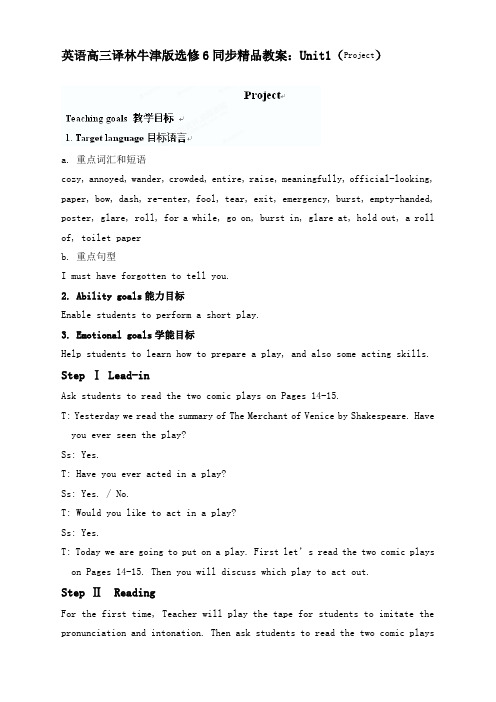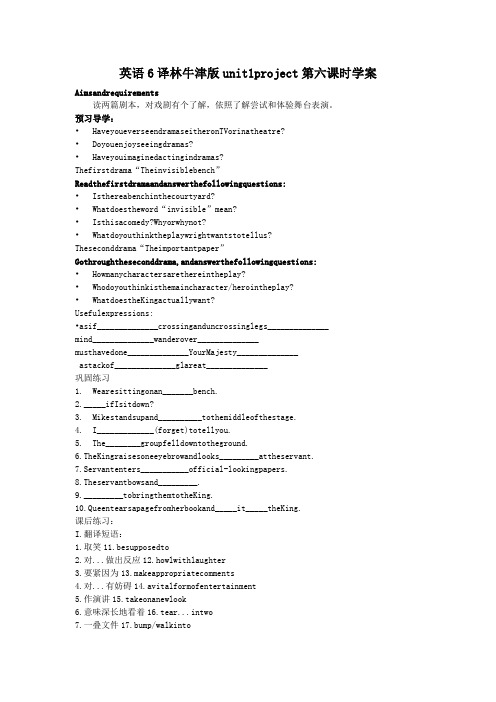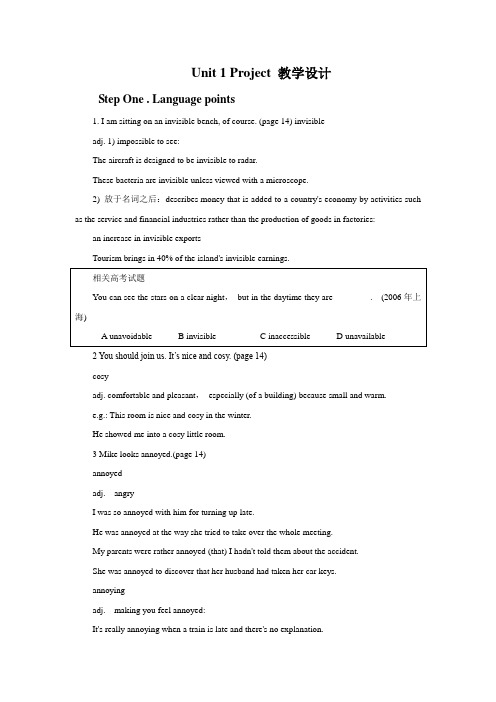译林牛津模块六第一单元project学案
- 格式:doc
- 大小:141.50 KB
- 文档页数:4


英语高三译林牛津版选修6同步精品教案:Unit1(Project)a. 重点词汇和短语cozy, annoyed, wander, crowded, entire, raise, meaningfully, official-looking, paper, bow, dash, re-enter, fool, tear, exit, emergency, burst, empty-handed, poster, glare, roll, for a while, go on, burst in, glare at, hold out, a roll of, toilet paperb. 重点句型I must have forgotten to tell you.2. Ability goals能力目标Enable students to perform a short play.3. Emotional goals学能目标Help students to learn how to prepare a play, and also some acting skills. Step Ⅰ Lead-inAsk students to read the two comic plays on Pages 14-15.T: Yesterday we read the summary of The Merchant of Venice by Shakespeare. Have you ever seen the play?Ss: Yes.T: Have you ever acted in a play?Ss: Yes. / No.T: Would you like to act in a play?Ss: Yes.T: Today we are going to put on a play. First let’s read the two comic plays on Pages 14-15. Then you will discuss which play to act out.Step Ⅱ ReadingFor the first time, Teacher will play the tape for students to imitate the pronunciation and intonation. Then ask students to read the two comic playson Pages 14-15. While reading, students should pay attention to the stage directions.T: Now I will play the tape for you to listen. Please pay attention to the pronunciation and the changes of intonation as well as the stage directions.After listening, you will be given several minutes to read the two plays. Step Ⅲ ExplanationAfter students finish reading the two plays, explain the difficult sentences to students. Before explaining the difficult sentences, students are asked to refer to Notes 18-22 on P67-68.Step Ⅳ DiscussionAsk the students to work in groups, discuss which play to choose. After the discussion, they will decide which play to act out. Then they will discuss who will play which each character and who will be the director.PreparingThe group members will discuss what kind of scenery they will need and who will make it. They will also discuss if they need props and who will find them. They will decide if they need costumes and who will make them or find them. When the final decision is made, they should find a good place and proper time to practise it.ProducingWhen everything is settled, students will practice the play. When they practise the play, make sure everyone should listen to the director. The director will help them learn their lines in the most believable way possible. Every member should learn his lines by heart. He or she also needs to know where the character is supposed to stand on the stage. They are expected to be dressed in costumes. PresentingAfter some practice outside of class, students will present their performance to the whole class.Step Ⅴ HomeworkPractice the play they choose and get prepared to act out the play in the class. Finish Exercises B1, B2 on Page 101.。

《译林版英语英语》(六年级上册)Project 1 A holiday album第1课时Teaching aims and learning objectives 教学目标1. 学生能够根据图片就假日进行问答2. 学生能正确使用一般过去式Focus of the lesson and predicted area of difficulty 教学重点和难点教学重点:学生能够根据图片就假日进行问答教学难点:学生能正确使用一般过去式Teaching procedures 教学过程Step 1. Song timeSing the song Rain, rain, go away.Step 2. Warm-upT: How’s the weather today?S1: It’s …T: How was the weather on National Day holiday?S2: It was sunny.T: Yes. It was sunny. And it wasn’t rainy during the National Day holiday. It was good for us to go out.Step 3. Talking about Alice’s trip1. T: Alice likes travelling very much. She often goes travelling for her holiday. Shewent to many places last year. Let’s see some of her photos to see where shewent and what she did.T: (教师简单介绍照片) Alice went to a lot of places last year. She went to Beijing for the National Day holiday. She also went to Tian’anmen Square and the Great Wall. “China is really great!” She said to me after she came back. For winterholiday, Alice went to Sanya. It was very hot there in winter. It was sunny and the sky was blue. She went swimming and played a lot on the beach. She had a good time.T: For her summer holiday, Alice went to Hong Kong in July. She went toDisneyland and had great fun there. She liked it very much. She also went toLondon with her family. She saw Big Ben there. How happy Alice was!Students enjoy the photos on which there are the names of the holidays and the names of the places.2. Try to answer following questions (PPT呈现)T: Where did Alice go last year?S3: She went to Beijing, Sanya, Hong Kong and London.T: What did she do in Beijing?S4: She visited Tian’anmen Square and the Great Wall.T: Did she go swimming in Sanya?S5: Yes, she did. She also played a lot on the beach.T: Did she have great fun in Disneyland?S6: Yes, she did.T: What did she see in London?S7: She saw Big Ben there.Step 4. Try to ask1. T: Alice was so happy. I also went traveling this summer holiday. It was great fun.Do you want to know something about it? If you do, you can ask questions with “Where, What, How, Did you…?” Who can try first?2. Students can ask the following questions:e.g.S1: Where did you go for the summer holiday?T: I went to Xiamen. (PPT出现厦门大学、海滨等照片,教师回答以表格方式呈现在板书上)2) S2: What did you do there?T: I went there on the 18th of August. On the second day, I visited XiamenUniversity. On the third day, I saw the sunrise and went to beaches.3) S3: Did you swim?T: No, I didn’t.4) S4: Did you ride a bicycle there?T: Yes, I did. On the fourth day, I rode a bicycle along the sea.5) S5: How was the weather?T: It was rainy on August 19th, it was fine on the other days.2. 教师呈现表格,让学生对教师的厦门之行有更详细的了解3. Review the past form of some verbsT: Do you remember these words? Can you tell me quickly? (PPT呈现be动词和行为动词原形,不同类别用不同底色,学生回答完之后归纳动词变成过去式的规律)4. Try to retellT: Now, you know very clearly about my trip. I think you can retell according to the form.Step 5. Ask and answer1. T: This was my summer holiday. It was great fun. How was your holiday? Wheredid you go for the National Day holiday(/New Year’s Day/May Day/summerholiday/...)? Would you like to share your holiday fun with your classmates?Please take out the photos or pictures you prepared, ask and answer in pairs.(PPT呈现句型,学生对话时教师巡视、倾听,关注学生在交流时是否注意到了动词过去式的准确运用,对薄弱学生进行适当的提醒和纠正。

英语6译林牛津版unit1project第六课时学案Aimsandrequirements读两篇剧本,对戏剧有个了解,依照了解尝试和体验舞台表演。
预习导学:•HaveyoueverseendramaseitheronTVorinatheatre? •Doyouenjoyseeingdramas?•Haveyouimaginedactingindramas?Thefirstdrama“Theinvisiblebench”Readthefirstdramaandanswerthefollowingquestions: •Isthereabenchinthecourtyard?•Whatdoestheword“invisible”mean?•Isthisacomedy?Whyorwhynot? •Whatdoyouthinktheplaywrightwantstotellus?Theseconddrama“Theimportantpaper”Gothroughtheseconddrama,andanswerthefollowingquestions: •Howmanycharactersarethereintheplay? •Whodoyouthinkisthemaincharacter/herointheplay? •WhatdoestheKingactuallywant?Usefulexpressions:•asif______________crossinganduncrossinglegs______________mind______________wanderover______________musthavedone______________YourMajesty______________astackof______________glareat______________巩固练习1. Wearesittingonan_______bench.2._____ifIsitdown?3. Mikestandsupand__________tothemiddleofthestage.4. I_____________(forget)totellyou.5. The________groupfelldowntotheground.6.TheKingraisesoneeyebrowandlooks_________attheservant.7.Servantenters___________official-lookingpapers.8.Theservantbowsand_________.9._________tobringthemtotheKing.10.Queentearsapagefromherbookand_____it_____theKing.课后练习:I.翻译短语:1.取笑11.besupposedto2.对...做出反应12.howlwithlaughter3.要紧因为13.makeappropriatecomments4.对...有妨碍14.avitalformofentertainment5.作演讲15.takeonanewlook6.意味深长地看着16.tear...intwo7.一叠文件17.bump/walkinto8.突然冲入18.frombothhomeandabroad9.追寻...的足迹19.queueupforthebus10.绊倒20.especiallyincrosstalkshowsII.Multiplechoice.1.I’mnotfamiliarwiththisplace.It’sthefirsttimeI________here,youknow.A.amB.wasC.havebeenD.hadbeen2.________aboutthestorm,weallstrengthenedourhouses.A.TellingB.ToldC.HavetoldD.Havingtold3.We________verymuchtomeetingyouagain.A.lookingforwardB.expectC.exceptingD.arelookingforward4.Hewon’tapologizetomeunlesshismother________himto.A.asksB.askedC.willaskD.hasbeenasking5.I’mpleasedtosaythatallofyou______greatly____ourspokenEnglishsofar.A.had,improvedB.have,improvedC./,improvedD.are,improving6.Don’tgetoffthebusuntilit________.A.stopsB.stoppedC.hasstoppedD.willstop7.Bythetimehe________home,hisfatherwillhaveleftforParisonbusiness.A.gotB.gettingC.getsD.hasgot8.Nooneiswillingtomakefriendswiththosewho_______always_______lies.A.is,tellingB./,tellsC./,tellD.are,telling9.Thefilmisamazing.It’sbetterthananyotherfilmI¬¬¬_______before.A.hadseenB.haveeverseenC.sawD.haveneverseen10.Writingistoughwork,butI’msureit________.A.worthwhileB.worthitC.isworthD.isworthit11.Agoodfriendshouldbekindandhelpful.________ismymother.A.SuchafriendB.SuchonefriendC.NosuchfriendD.Onesuchfriend12.Mycousin______menottotakeweight-lossmedicine,butIjustwon’tlisten.A.isadvisingB.advisedC.advisesD.hasbeenadvising13.Frightenedbythesnake,thegirl________cryingnearthewell.A.burstinB.burstuponC.burstintoD.burstout14.He________dead,formanypeoplesawthetruckhithimbadlylastnight.A.musthaveB.musthavebeenC.can’tbeD.mustbe15.Indeedhefoundnothing________inmylesson,becauseheonlyhadgreat_______incompute rgames.A.amused,interestedB.amusing,interestedC.amused,interestD.amusing,interests16.Heagainmadeamistakeinsolvingthemathsproblem________.A.somewhatB.somehowC.anyhowD.anyway17.---John,Imust_______---Ihaveanimportantmeetingat8o’clock.---OK!Takecare!A.runB.walkC.dashD.exit18.Marywasn’tsatisfiedwiththebluedress,sotheshopkeeper_______anotherdressforhertotryon.A.heldonB.heldtoC.heldoutD.heldup19.AsIpulledthesheetoutofthetypewriter,it________.A.tearsB.istornC.toreD.istearing20.He________hishandand_________toreporthisanswerswhenaskedto.A.rose,raisedB.raised,raisedC.raised,roseD.rose,roseIII.Fillintheblanks.1.One______(鲜为人知的)factisthathewasoncea_______(备受喜爱的)comedian.2.ZhaoLirongwasan______(热情的)_____(女演员).She’llliveinourheartforever.3.BiFujian’s_______(受欢迎)withallagegroupsisduetohish________(幽默的)hostingstyle.4.Hesayssittingonan__________(看不见的)benchisvery__________.(舒服的)5.Theteacherlooked__________(恼火的)whenhisstudent___________(漫步)overtothecourtyardinsteadoffollowinghim.6.Fatheroftenmakesusburstintol__________bytellingusdifferentj_________.7.D__________isapersoninc___________oftheperformanceofadrama.8.Heobservespeople’sb___________ineverydaylifeandactsoutons_________.9.Crystal’sa__________toimproviseleadstohiss__________.10.C_________,au__________artforminChina,hasdevelopedalotofforeigners inrecentyears.pletethesentences.1.Whenisyournewbook________on_________(上市)?2.Heshouldhave__________________(挪点地方)fortheoldman.3.Hereyouareatlast!Wehave__________________(一直在等)foryouforhours.4.__________________(后来),hegotajobasagovernmentofficial.5.Shenevergoesoutwithout__________herself__________(化妆).6.Canyoutellmewhat__________(妨碍)theincidenthad_________hisfamily?7.Hestoppeddriving,__________________(仿佛)toanswerthemobilephone.8.Doyoumind___________________(我试戴一下)onyournewglass?9.Isn’titeverybody’s______________________(责任)protectourenvironment?10.Heisalsofamous_____________________(因为主持)theAcademyAwards.。

一、单元教学内容:六上Project 1 A holiday album
二、单元教材分析:
本单元的目的是通过谈论假期的活动,并制作、介绍假日相册,来复习前四单元所学的词汇、句型。
尤其要注重疑问词、动词过去式的正确运用。
三、单元教学目标:
1.学生在语境中对Unit1-4的知识进行复习和运用。
2.复习并学习部分动词过去式的不规则变化形式。
3.指导学生运用学习策略,自主归纳复习。
4.通过制作“假日相册”,复习1~4单元旧知。
5.重点复习有关“假日照片”的过去式问题及回答。
6.指导介绍“假日相册”的内容和顺序。
四、教学重难点:
复习并学习部分动词过去式的不规则变化形式,指导介绍“假日相册”的内容和顺序。
五、单元课时安排:
Period 1 A holiday album第一课时
Period 2 A holiday album第二课时
Period 3 综合练习
教学反思:
教学内容6上 Project 1 A holiday album (Period 2)
教学课时第二课时主备人田伟佳复备人朱虎华栾妮莉
教学目标1.通过制作“假日相册”,复习1~4单元旧知。
2.重点复习有关“假日照片”的过去式问题及回答。
3.指导介绍“假日相册”的内容和顺序。
教学重点与
难点
指导介绍“假日相册”的内容和顺序。
教学准备1.教具准备:假日照片,课件
2.板书准备:写好课题。

Unit 1 Project 教学设计Step One . Language points1. I am sitting on an invisible bench, of course. (page 14) invisibleadj. 1) impossible to see:The aircraft is designed to be invisible to radar.These bacteria are invisible unless viewed with a microscope.2) 放于名词之后:describes money that is added to a country's economy by activities such as the service and financial industries rather than the production of goods in factories: an increase in invisible exportsTourism brings in 40% of the island's invisible earnings.2 You should join us. It’s nice and cosy. (page 14)cosyadj. comfortable and pleasant,especially (of a building) because small and warm.e.g.: This room is nice and cosy in the winter.He showed me into a cosy little room.3 Mike looks annoyed.(page 14)annoyedadj. angryI was so annoyed with him for turning up late.He was annoyed at the way she tried to take over the whole meeting.My parents were rather annoyed (that) I hadn't told them about the accident.She was annoyed to discover that her husband had taken her car keys.annoyingadj. making you feel annoyed:It's really annoying when a train is late and there's no explanation.He's got a really annoying laugh.annoyvt. to make someone angry.Tim really annoyed me in the meeting this morning.I'm sorry - is my cough annoying you?[+ that] It annoys me that she just expects us to help.It really annoys me when people expect me to tip as well as pay a service charge in a restaurant.5 It got too crowded, so I moved the bench.(page 14)crowdedadj. If a place is crowded, it is full of people.By ten o'clock the bar was crowded.[C] a large group of people who have gathered together.A crowd of about 15 000 attended the concert.Step Two:书面表达假如你们学校“英语爱好者俱乐部”将对“良好饮食习惯”这一话题进行讨论。
译林牛津模块6 unit 1 全单元简案1st period Welcome to the Unit(译林牛津版高二英语选修六教案教学设计)整理Unit 1 Laughter is good for you南京九中陆昕Teaching aims:(1).Make students participate in a discussion about which event they think is the funniest and most enjoyable.(2) Encourage students to talk about their favourite comedians and the reasons why people like funny things.(3).By talking about the posters and discussing, students’ spoken English can be practised.Important points difficult points:(1).Students are expected to express their own opinions by talking about the posters and discussing.(2).Encourage students to speak freely.Procedure:Step 1: Lead-in(1) Life consists of laughter and tears. People around the world love to laugh. Which do you think is better for you, laughing every day or an apple per day?(2) Show students some pictures of Mr. Bean. Ask them how they feel when they see him.(Proper answers: silly, stupid, strange, funny…)(3) Show students some pictures of Chen Peisi, Pan Changjiang, Zhao Benshan, Niu Qun, Feng Gong, Da Shan. Ask students who they are and how they feel when they see them. (Comedians)Step 2: BrainstormingWhat makes people laugh?(Proper answers: jokes, comedians, funny movies, humorous stories, …)Step 3: Picture talkingChoose one picture, and have a free talk.(1). Grim Reaper has a sense of humour.(2). To keep a balance…(3). Where is my cola?Step4: Observation(1) Do the four posters share something in common? If so, what are they?(2) Which of the events do you think will be the funniest? Why?(3) Why do people like funny things?Step 5 Further discussion:How can we put more laughter in our lives?read funny stories, watch funny movies and …surround yourself with funny peopledevelop your own sense of humor…Step 6 Reading(1) Humour: What would you say? A British would say: “It’s a little damp outside.”(2) Joke: A: Where do you wash? B. In the spring. A. I didn’t ask when. I asked you where.(3) Do you like British sense of humour? Would you like to learn more about it?(4) scanning and skimming(5) Game: Who is the best joke-teller?Step 7 Homework(1) Do relevant exercises in Assessment Book.(2) Read Ronald Reagan on page 105 in Workbook.(3) Preview reading.文档内容到此结束,欢迎大家下载、修改、丰富并分享给更多有需要的人。
模块六第一单元project2012-11-27一.自学质疑:1.为…腾地方。
______________2.生气地_____________3.把纸撕成两瓣______________4.闯进;突然闯入。
____________5.怒目而视__________________6.递出;拿出;伸出。
____________7.冲出去____________________8. 撞到某人____________________二.互动探究1.as if 从句的语气及时态1.as if 从句用陈述语气的情况。
当说话者认为句子所述的是真实的或极有可能发生或存在的事实时。
It sounds as if it is raining.听起来像是在下雨。
He talks as if ___________ drunk.从他谈话的样子来看他是醉了。
2.as if 从句用虚拟语气的情况。
当说话人认为句子所述的是不真实的或极少有可能发生或存在的情况时。
从句虚拟语气动词时态的形式如下:(1)如果从句表示与现在事实相反,谓语动词用一般过去时。
You look as if you didn‘ t care.你看上去好像并不在乎。
He talks as if _______________________________.他说话的样子,好像他知道她在哪里似的。
(2)从句表示与过去事实相反,谓语动词用―had+过去分词‖。
He talks about Rome as if he had been there before.他说起罗马来好像他以前去过罗马似的。
The girl listened ________________________ stone.那女孩倾听着,一动也不动,像已经变成了石头似的。
(3)从句表示与将来事实相反,谓语动词用―would/could/might+动词原形‖。
He opened his mouth as if he would say something.他张开嘴好像要说什么。
It looks as if ____________snow.看来好像要下雪了。
当as if和as though从句的主语与主句一致时,该主语和后面的动词可以省略。
于是便出现下面几种结构:1)as if +不定式He opened his lips as if (he were) to make some reply.2)不定式+形容词或形容词短语Carrie felt as if unable to endure such a life. 嘉莉觉得似乎无法再忍受这种生活了。
He lay still for a long while, as if dead.3)as if +介词短语He looked about as if (he was) in search of something.4)as if +现在分词From time to time Jason turned round as though (he was) searching for someone.John paused as if expecting Mary to speak. 约翰停下来,似乎是等玛丽开口。
5)as if +过去分词The football player is rolling on the ground as if hurt badly in the leg.★牛刀小试1.【2012辽宁卷】30. Leave your key with your neighbor you lock yourself out one day.A. as long asB. even thoughC. in caseD. as if2011上海卷37The police officers in our city work hard _____ the rest of us can live asafe life.A. in caseB. as ifC. in order thatD. only if2011湖南卷33Jack wasn‘t saying anything, but the teacher smiled at him _______hehad done something very clever.A .as if B. in case C. while D. though4.〖08全国Ⅰ〗—Have you got any idea for the summer vacation?—I don‘t mind where we go______there‘s sun, sea and beach.A.as ifB.as long asC.now thatD.in order that5.【2012北京卷】35. Don‘t handle the vase as if it ____ made of steel.A. isB. wereC. has beenD. had been2. 情态动词加have done都是对过去事情的推测,区别只在于情态动词的不同一、―must+have+done‖ 表示对过去事情的肯定推测,译成―一定做过某事‖,该结构只用于肯定句。
1. It must have rained last night, for the ground is wet. 昨晚一定下雨了,因为地面还是湿的。
2. You _____________________________ speak to the servant. 你和仆人说话,一定是发疯了。
二、―can't+have+done‖表示对过去事情的否定推测,译成―不可能做过某事‖。
1. Mr. Smith can‗t have gone to Beijing, for I saw him in the library just now.史密斯先生不可能去北京了,我刚才还在图书馆见过他。
2. Mary________________________your money. She has gone home. 玛丽不可能偷你的钱,她回家去了。
三、―can+have+done‖ 表示对过去行为的怀疑,用于疑问句,译成―可能做过……吗?‖。
1. There is no light in the room. Can they have gone out? 屋里没有灯,他们可能出去了吗?2. There is nowhere to find them. Where __________________? 到处找不到他们,他们可能到什么地方去呢?四、―could+have+done‖ 是虚拟语气,表示对过去事情的假设,意思是本来能够做某事而没有做。
He could have passed the exam, but he was too careless. 本来他能够通过考试,但是他太粗心。
五、―may+have+done‖ 表示对发生过的事情的推测,意思是―可能已经‖或―也许已经‖,用于肯定句中。
—What has happened to George?—I don't know. He may have got lost.—乔治发生了什么事?——我不知道,他可能迷路了。
六、―might+have+done‖ 表示对过去事情的推测,might与may意思相同,但可能性更小。
多用于虚拟语气结构中。
1. He might have given you more help, even though he was busy. (MET90) 他或许会多给你一些帮助,即使他很忙。
2. She ___________________greater progress, if you had given her more chances.如果你多给她点机会,她可能已经取得更大的成绩。
七、―would+have+done‖ 虚拟语气,表示对过去事情的假设,意思是―本来会做‖。
1. I would have told you all about the boy's story, but you didn't ask me.我本来会告诉你这个小男孩的故事,但是你没有问我。
2. Without your help, I wouldn't have achieved so much. 没有你的帮助,我是不会取得如此大的成绩。
八、―should+have+done‖ 意思是―本来应该做某事,而实际没做。
‖ ―shouldn‗t+have+done‖表示本来不应该做某事,而实际做了。
含有指责对方或自责的含意。
1. Tom, you are too lazy. The work should have been finished yesterday.汤姆,你太懒惰了,这项工作本来应该昨天就做完的。
2. Look, Tom is crying. I __________________________ on him. 看,汤姆哭了,我本来不应该对他如此严厉。
九、―ought to+have+done‖ 表示过去应该做而实际并没有做,译成―理应做……‖,往往表示遗憾。
与―should+have+done‖用法基本一样。
I ought to have gone home last Sunday. 我理应上星期日回家。
You ought not to have given him more help. 你不应该帮助他那么多。
十、―need+have+done‖ 表示本来需要做某事而没有做。
―needn‗t+have+done‖则表示―本来不需要做某事而做了‖。
I needn‗t have bought so much wi ne—only five people came. 我本来没有必要买这么多酒,只来了五个人。
He ________________________ the station. In that case, be wouldn't have missed the train.他本来需要快点去车站,那样的话,他就不会误了火车。
★牛刀小试1.【2012北京卷】33. We ______ the difficulty together, but why didn‘t you tell me?A. should faceB. might faceC. could have facedD. must have faced2. 2011江苏卷,--I left my handbag on the train, but luckily someone gave it to a railway official.—How unbelievable to get it back! I mean, someone ______ it.A. will have stolenB. might have stolenC. should have stolenD. must have stolen3 .〖10安徽〗Jack described his father, who _______a brave boy many years ago, as a strong– willed manA. would beB. would have beenC. must beD. must have been4 .〖10湖北〗It‘s said that they have swum to the island from the continent, but they ________(不可能做到)because the ocean in between is too wide. (do)5. 〖09上海〗It_____ have been Tom that parked the car here, as he is the only one with a car.A. mayB. canC. mustD. should三.迁移应用。